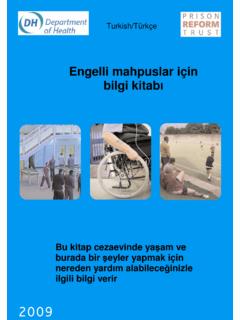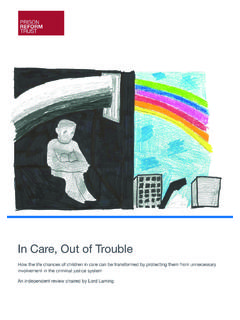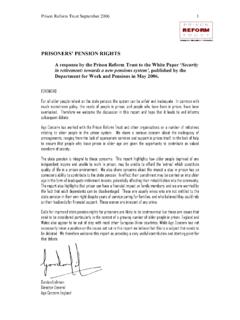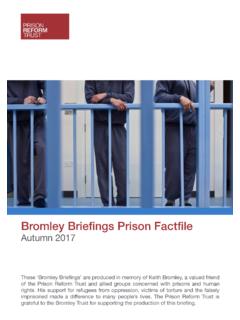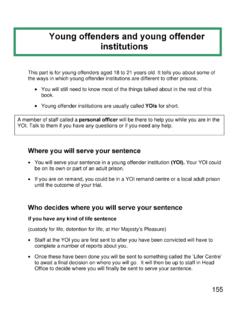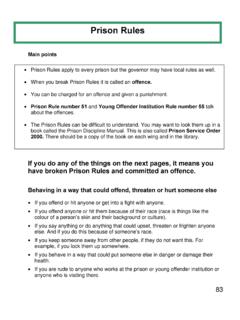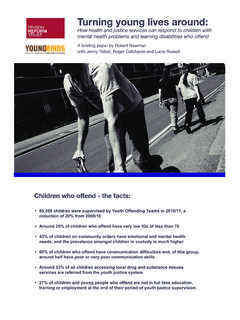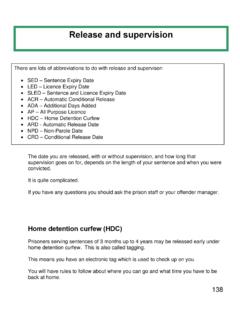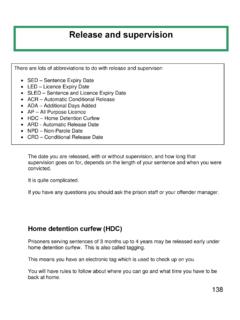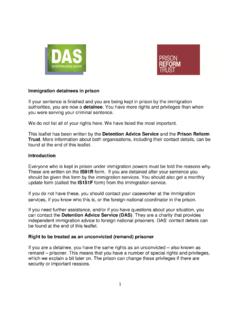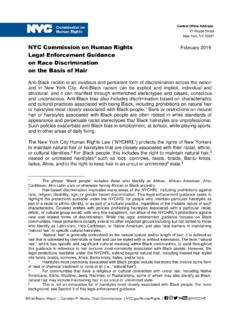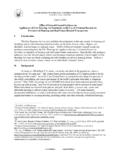Transcription of Information book for prisoners with a disability
1 Information book for prisoners with a disability T h i s b o o k w i l l gi v e y o u i n fo r m a t i o n a b o u t p ri s o n l i fe a n d wh e re y o u c a n ge t h e l p t o d o t h i n g s 2009. Offender Health and Prison Reform Trust 2009. This publication can be shared copied distributed and transmitted but not sold. It can not be altered in any way without the permission of the copyright owners. Offender Health is a partnership between the Ministry of Justice and the Department of Health. We work with the NHS, social care and criminal justice agencies to improve the standard of healthcare for offenders. We aim to provide offenders with the same quality and range of health and social care services as the general public receives. The Prison Reform Trust works to create a fair and decent prison system. We do this by looking at how prisons are working, giving Information to prisoners , staff and people outside and by asking the government and officials to make changes.
2 First published in 2004 by the Prison Reform Trust kindly supported by Lloyd's Charities Trust. This edition published in 2009 by the Prison Reform Trust kindly supported by the Hadley Trust and Offender Health. Many thanks to the following for their help with this booklet: Mencap, Her Majesty's Inspectorate of Prisons, Cloisters, Race Equality Action Group and all the disability liaison officers and other prison staff who commented on the draft. Staff and prisoners at HMP Birmingham, HMP Downview, HMP. Feltham and HMP Leyhill for their help with focus groups. Offender Health and PRT staff for content, photos and design. This book will give you Information about: your rights asking for help and who to ask getting the help you need. You can get copies of this book : in the library from your personal officer by calling or writing to the Prison Reform Trust office (020 7251. 5070 or PRT, Freepost, ND6125, London EC1B 1PN). from your disability liaison officer (DLO).
3 From the healthcare team. Your disability liaison officer (DLO) or personal officer can download a copy from the Prison Service intranet. It is also on these websites: Prison Service : Offender Health : Prison Reform Trust: This book is also available in: Easy read version CD. Contents What is a disability ? 1. Your rights 3. Arriving in prison 7. Who can help? 11. Where you will live 15. Daily life 17. Help with daily life 21. Money 23. Making a complaint 25. Your health 27. Keeping in touch 31. Your sentence 33. Where to get more Information 35. Leaving prison 37. Helpful organisations 41. what is a disability ? What is a disability ? You can not see most disabilities. Lots of people in prison have a disability . You can count as having a disability if: You have a long term illness (like asthma) that can stop you doing things You have a learning disability , a learning difficulty (like dyslexia) or autism that makes it hard for you to understand things sometimes You have a serious mental health problem (like depression) that has been going on for a long time You have difficulties with seeing, hearing, speaking or getting around.
4 You do not have to say you have a disability if you don't want to. But, if you do not tell the prison, they may not be able to help you. You can find more Information in Prison Service Order (PSO) 2855, prisoners with Disabilities. This is in the library. 1. what is a disability ? The law says that the Prison Service has to: Help people with a disability to be involved in all aspects of prison life Involve people with a disability in decisions about them Encourage positive attitudes towards people with a disability . 2. your rights Your rights - disability discrimination Act 2005 . There is a law called the disability discrimination Act (DDA). which is there to keep people with disabilities from being treated differently to other people or in a bad way. The prison must follow the DDA. It should make reasonable changes so that: You can take a full part in prison life You are treated in a good and fair way by staff and other prisoners . There is more Information in PSO 2855 ( prisoners with Disabilities) and Prison Standard 8.
5 There should be copies of both in the library. You should consider telling prison staff about your disability . They must keep this Information private and only tell people like healthcare who can help you. If you tell the prison that you have a disability or if staff know that you have a disability they have to look at what you need and take action to meet those needs. This is called making reasonable changes. They may have to arrange a move to another prison if they cannot meet your needs. If you do not tell the prison, they may not know that they need to make special arrangements to help you. 3. your rights The DDA - What does it mean? The law says that someone has a disability if they have a physical, mental or sensory impairment which has a significant and long term effect on their ability to do everyday things. Impairment is something that stops or limits them doing something that most other people can do. The following list are all considered to be disabilities: Diabetes Dyslexia Autism Deafness Asthma Depression Bad facial scarring Arthritis Cancer.
6 Physical disabilities are things like: difficulties with walking difficulties with handling things like door handles and knives and forks difficulties with carrying heavy things. 4. your rights Sensory impairment includes: part or severe deafness eyesight problems not corrected by glasses loss of feeling, smell or taste where it has a major effect on daily life. Other disabilities are things like: learning disabilities mental health problems learning difficulties autism. Long term means over 12 months. This means that if you break your leg and need a wheelchair for a few months you would not be considered to have a disability under the DDA. However the prison should still make changes to ensure that you can still be involved in prison life. These things are not disabilities under the DDA: addiction to alcohol or drugs hay fever tendencies to set fires, steal or hurt people tattoos and piercings. Anyone who has difficulty in understanding their rights should have them explained to them.
7 You can ask to speak to the disability liaison officer or an officer on your wing. 5. your rights 6. arriving in prison Arriving in prison You will be taken to reception. Everybody will have a health assessment from a doctor or nurse. You can ask to see a doctor or nurse if you have a health problem. You can tell them about any disabilities you have. This is a good time to mention any worries you have about being in prison. If you have moved from another prison please tell staff about any disabilities you have. They may not have this Information even if you have come from another prison. You can also ask to speak to the disability liaison officer (DLO). You might have to wait for them to come and see you. They might fill in a disability questionnaire (a form) with you. Any Information you tell the DLO is confidential. If you have trouble with reading or understanding things you should be given Information you can understand. You can ask for someone to explain things to you.
8 You should be given an induction pack. This has Information about prison rules and the prison you are in. If you need help to read this you can ask an officer to explain it you. The prison might have a CD or tape that you can listen to. 7. arriving in prison If you did not talk to a DLO at reception, you can ask to see them at any time while you are in prison. You can put in a request to see them using the application forms on the wing. What to do if you feel upset or worried It is important to talk to someone if you feel like this. You can tell: prison staff healthcare staff chaplain listener/buddy disability liaison officer. Searching Everybody has to have a full body search when they come into prison. If you have a disability or a health condition that makes this difficult, you should tell the staff. You will still have to have a search but the doctor or nurse will tell the officers how to do this in the best way. Induction This is where you find out about the prison.
9 You will be told all the rules of the prison. 8. arriving in prison Ask the officers in the induction wing if there is anything you don't understand. You might also meet the legal services officer in the prison, the chaplain and other prison staff. There is more Information about this in the prisoners ' Information book . The prison will assess you to see if you can do work or education. If you have a disability or a medical condition that makes working difficult, you should tell the staff. The prison should make changes so that you can go to work or education. If you have any difficulties outside such as with benefits or housing, you can tell staff. They will tell you who can help you. 9. arriving in prison 10. who can help Who can help? It is important to ask someone if you have any questions. disability liaison officer (DLO). All prisons have a disability liaison officer (DLO). Their job is to support people with disabilities. They should also be able to give you Information and advice.
10 You can put in a request form to meet the DLO and talk to them about any support you need. If you cannot fill in a form tell your personal officer or an officer on your wing that you need to speak to the DLO. Ask them to help you to contact the DLO. The disability liaison officer can talk to prisoners with disabilities look at the needs people have and make a record of these give out Information to prisoners and staff talk to the governor and other managers about what is needed in the prison organise activities for people with disabilities make sure that people with disabilities can take part in prison activities. 11. who can help Chaplains Chaplains help you to practice your religion. They will be from a number of faiths. You can talk to them about how you are feeling even if you are not religious. The Samaritans They have a help line number 08457 90 90 90 that you can call if you are feeling worried or anxious. This is a free call but you will need to put in a pin number first.
